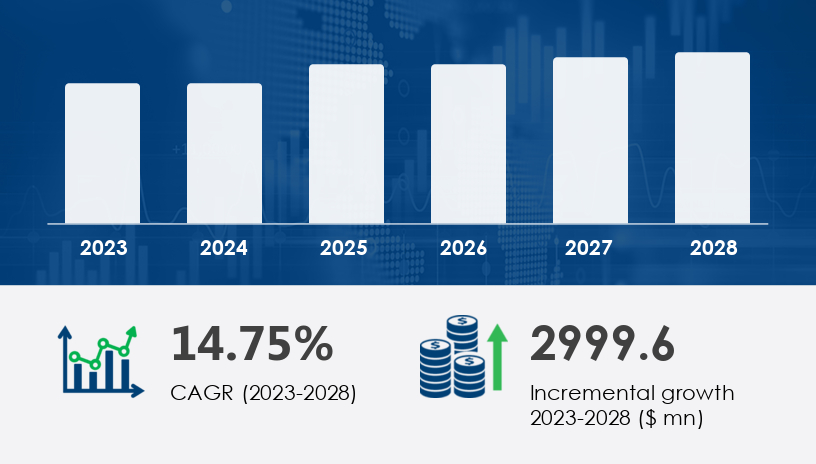Automatic Irrigation Equipment Market Size 2024-2028
The automatic irrigation equipment market is forecast to grow by USD 3 billion at a CAGR of 14.75% from 2023 to 2028. This significant market expansion is driven by technological advancements and increased adoption of AI and machine learning (ML) in irrigation systems, enabling more efficient water usage and improved crop yields. However, the market faces challenges, such as the easy availability of manual irrigation systems and traditional farming methods, which may hinder growth.

For more details about the industry, get the PDF sample report for free
Automatic Irrigation Equipment Market Segmentation
By Product Insights
- Automatic Irrigation Controllers
- Automatic Irrigation Sensors
- Automatic Irrigation Valves
- Automatic Irrigation Injectors
- Automatic Irrigation Flow Meters
By End-User
- Agriculture
- Commercial
- Residential
By Geography
- North America
- Europe
- APAC
- South America
- Middle East and Africa
Market Dynamics: Drivers, Trends, and Challenges
Drivers
- Technological Advances in Automatic Irrigation Equipment: Innovations in automation, including AI and ML, optimize irrigation, conserve water, and enhance crop yields. These technologies reduce water wastage, minimize disruptions from supply chain issues, and improve water conservation during periods of water scarcity.
Trends
- Adoption of AI and ML: The integration of AI and ML in irrigation systems is transforming agricultural processes. These systems help monitor soil conditions, weather patterns, and water levels to optimize irrigation schedules, improve crop management, and enhance water conservation.
Challenges
- Availability of Substitutes: The market faces competition from traditional irrigation systems, such as manual and surface irrigation methods, which are cheaper and more accessible. The high initial cost of automatic irrigation systems may deter small-scale farmers from transitioning to automated solutions.
Get more details by ordering the complete report
Key Players in the Automatic Irrigation Equipment Market
- Automat Industries Pvt. Ltd.
- Bermad CS Ltd.
- Galcon Bakarim Agricultural Cooperative Society Ltd.
- Grundfos Holding AS
- Hunter Industries Inc.
- Husqvarna AB
- HydroPoint Data Systems Inc.
- Irritrol
- Jain Irrigation Systems Ltd.
- Lindsay Corp.
- Mazzei Injector Co. LLC
- Morrill Industries Inc.
- Nelson Irrigation Corp.
- Novedades Agricolas SA
- Orbia Advance Corp. S.A.B. de C.V.
- Rachio Inc.
- Rain Bird Corp.
- Rubicon Water
- The Toro Co.
- Valmont Industries Inc.
Recent Developments
- Bermad CS Ltd.: Introduced several products, including the Omega cloud-based irrigation controller, GreenApp smart irrigation solenoid controller, and BIC 1000 multi-function irrigation controller.
(February 2025)
Market Insights
Companies in the automatic irrigation equipment industry are enhancing their market presence through strategic alliances, partnerships, and mergers. As water scarcity becomes an increasingly critical concern globally, governments and organizations are providing financial incentives to encourage the adoption of smart irrigation technologies, further promoting market growth.